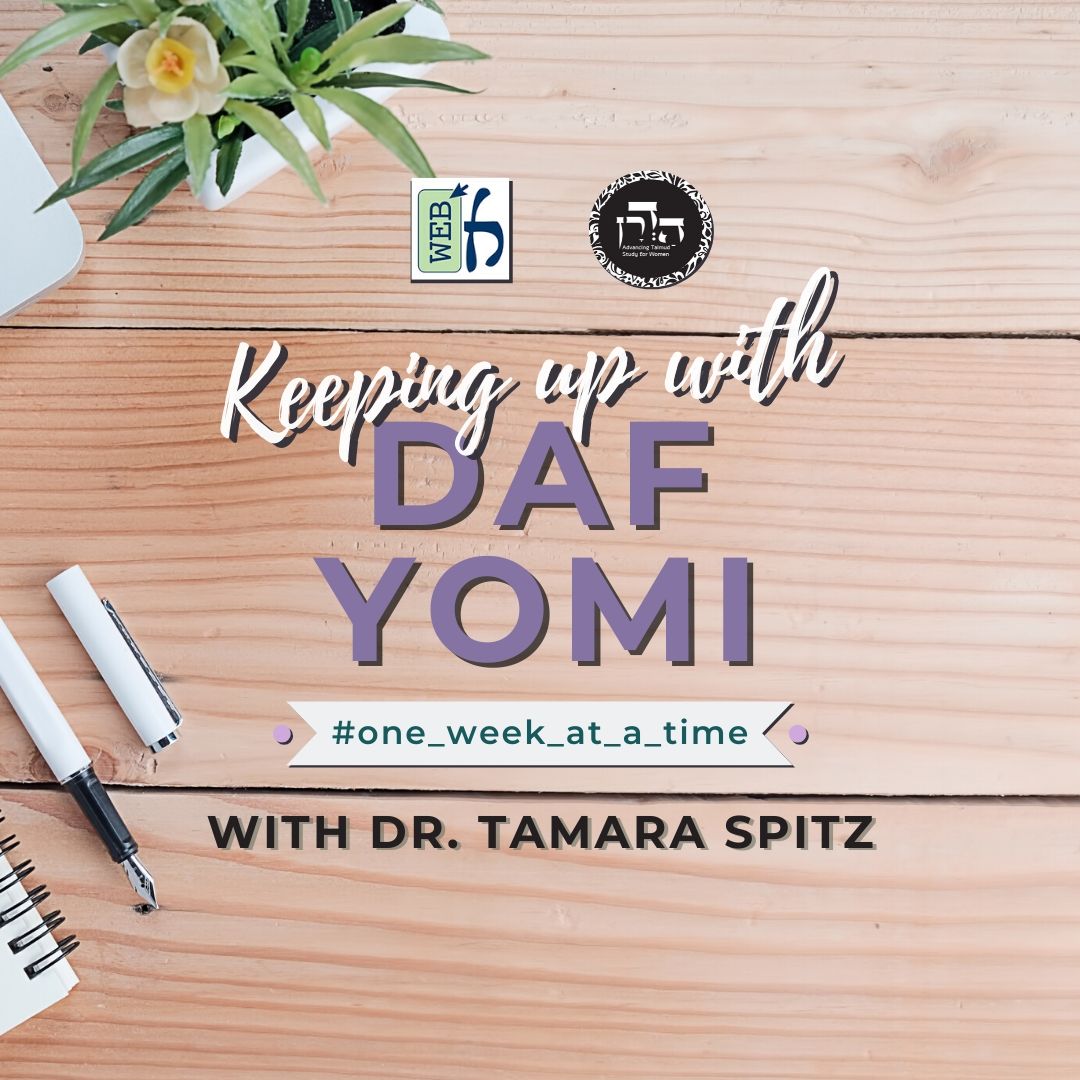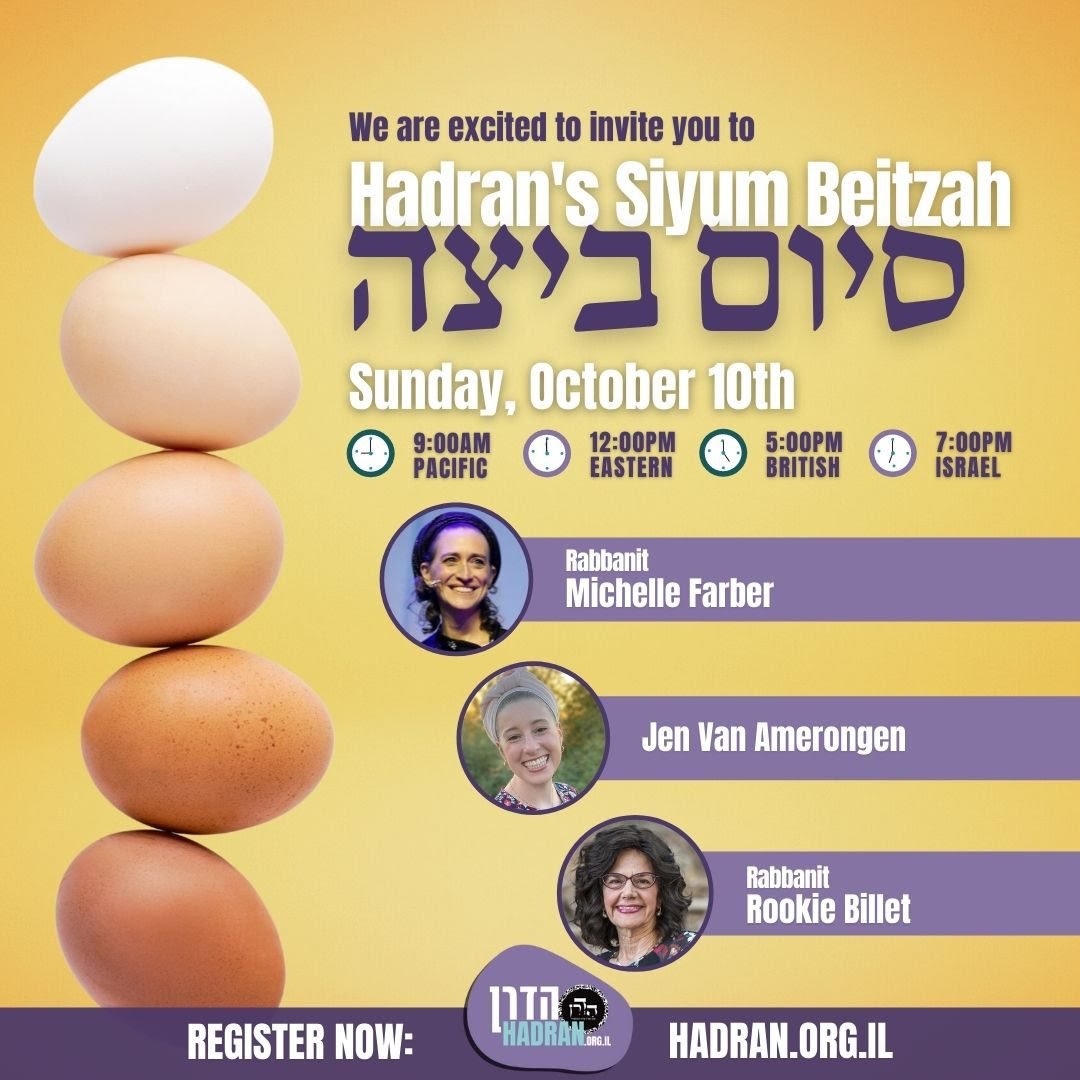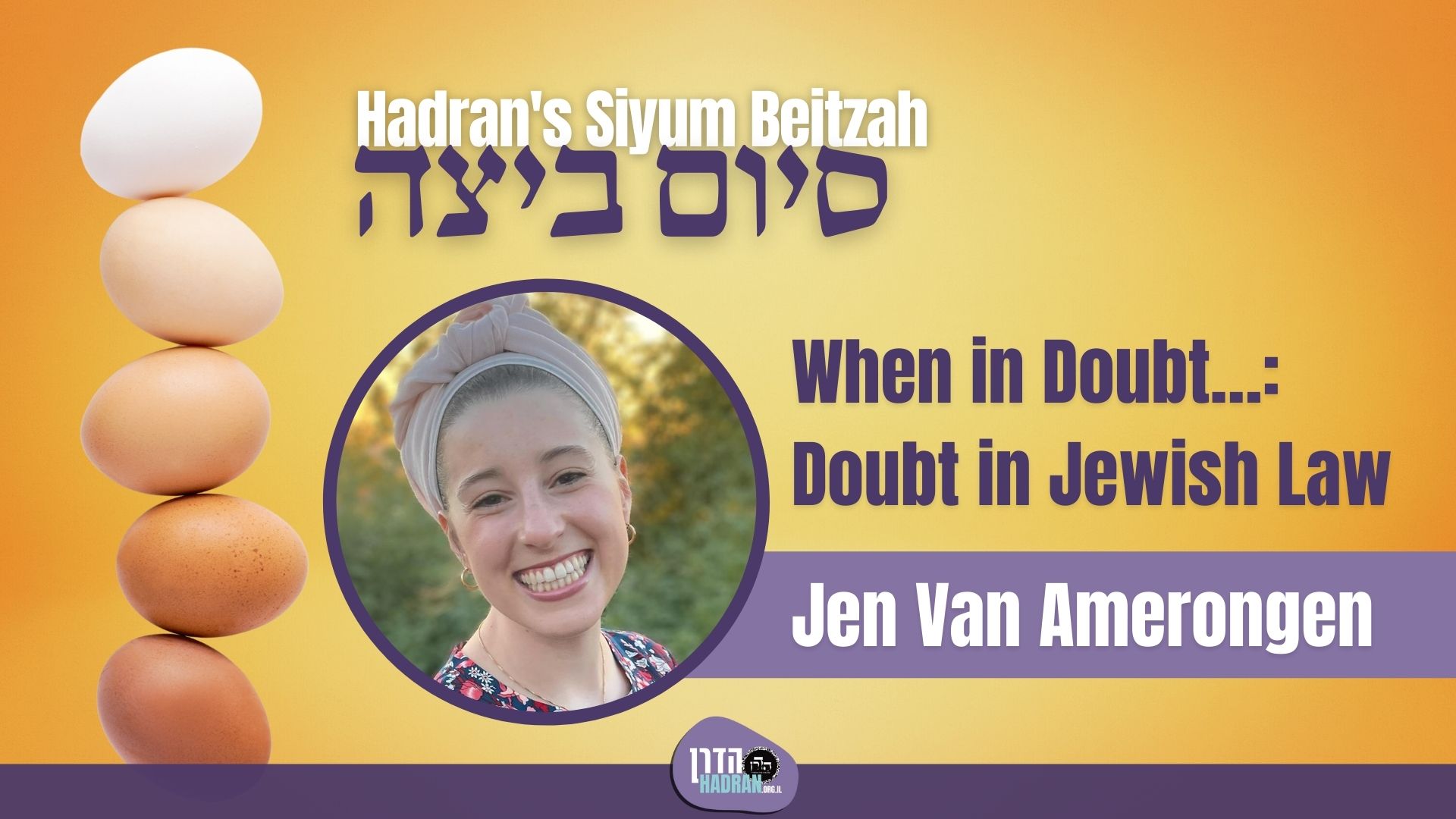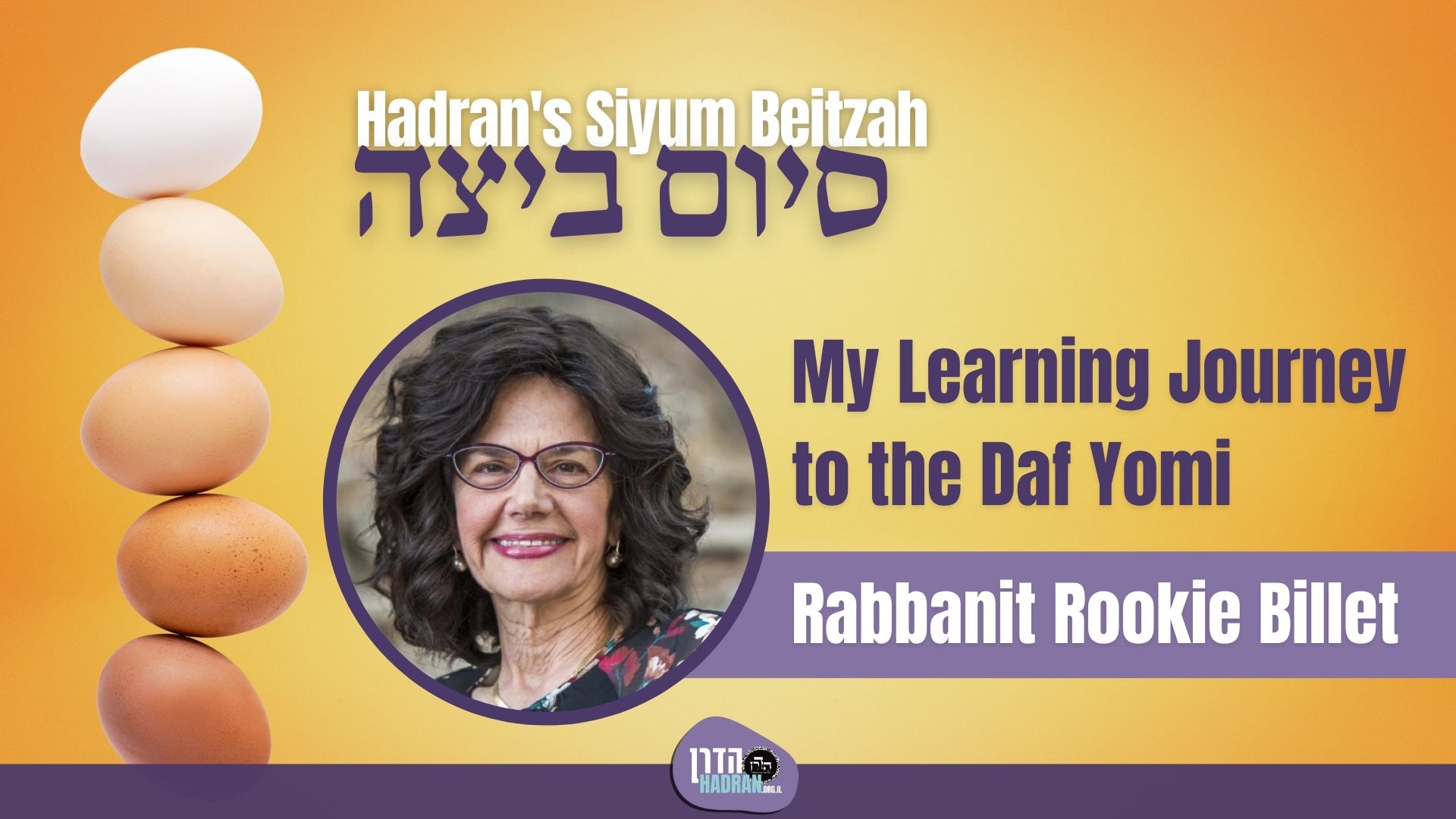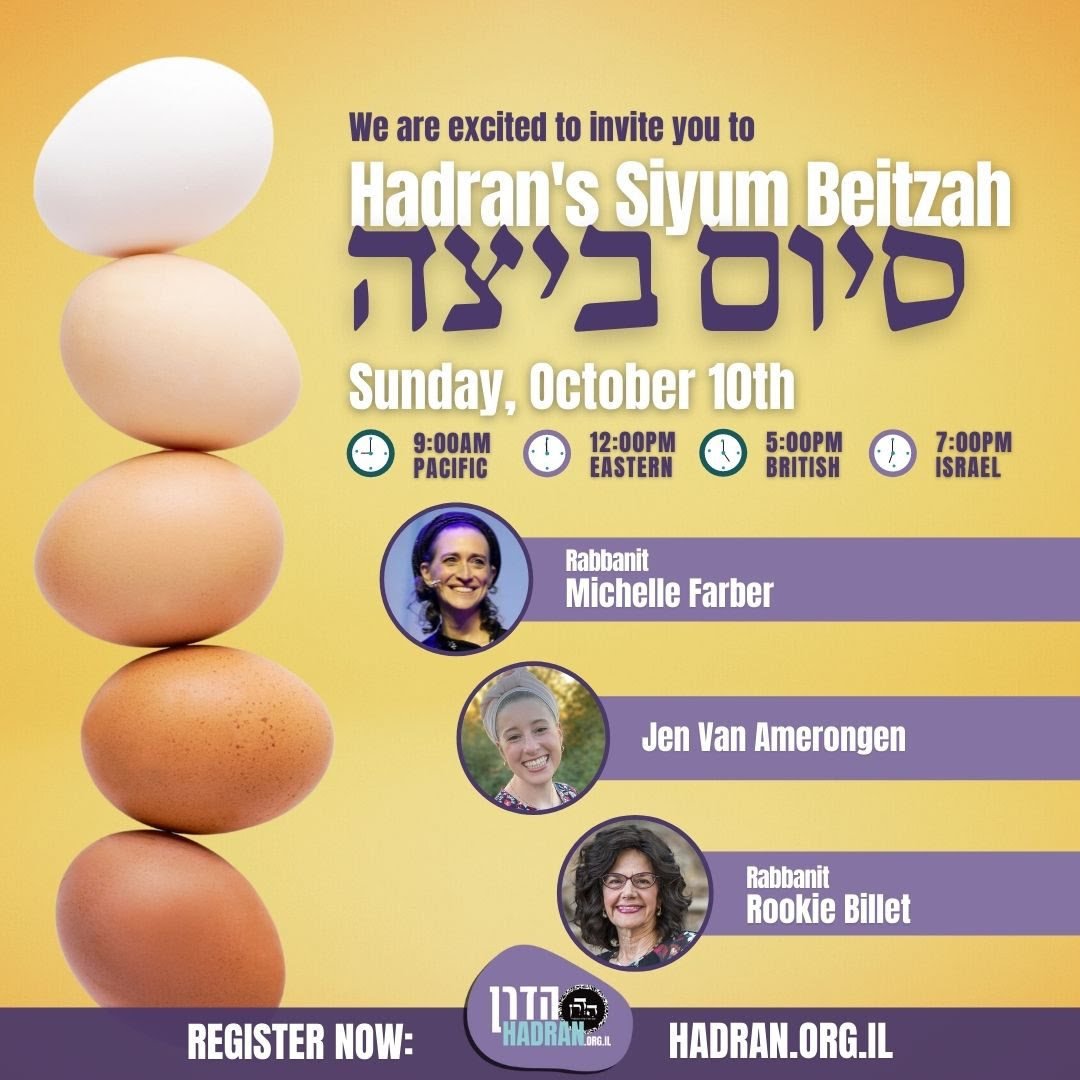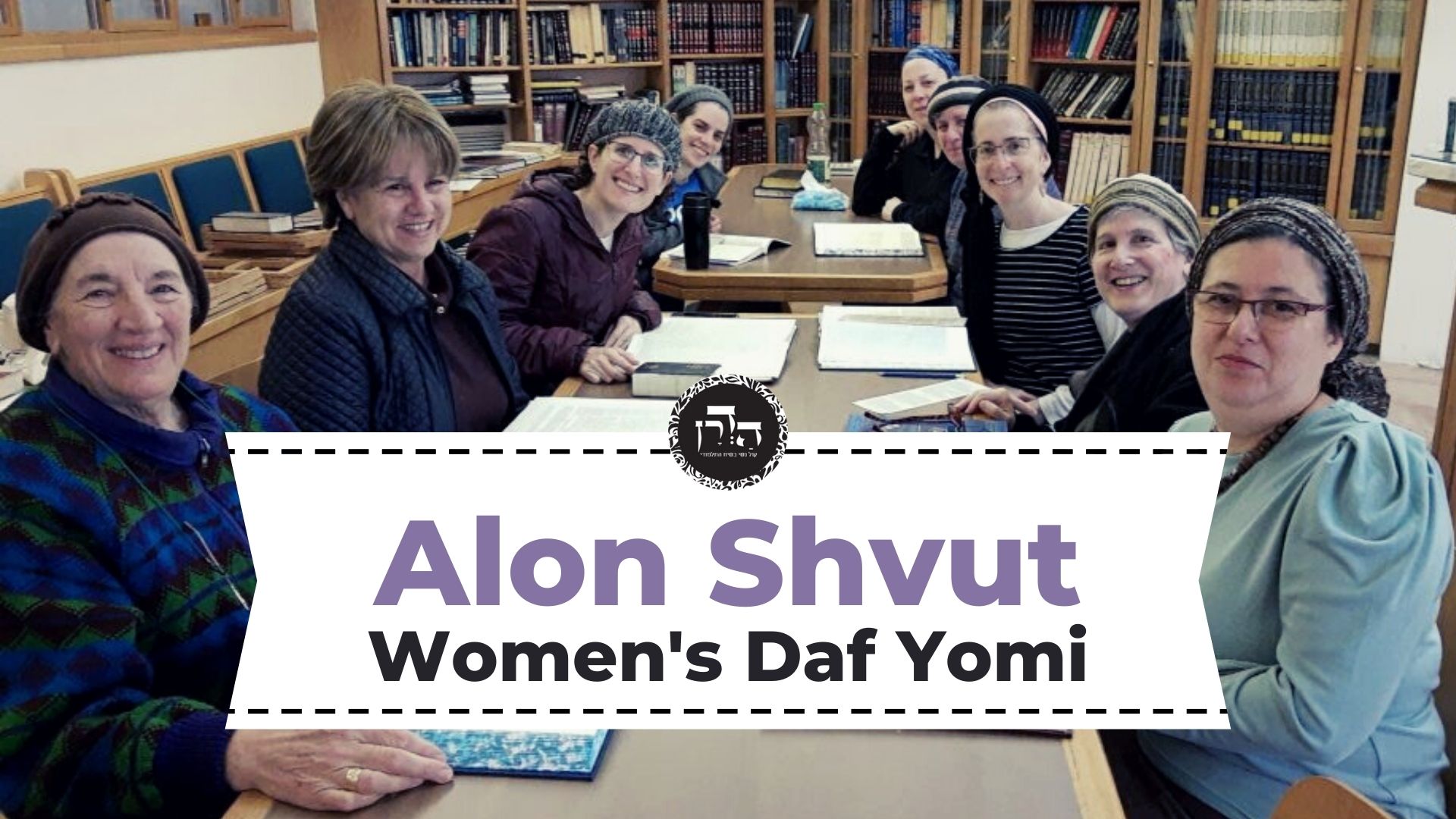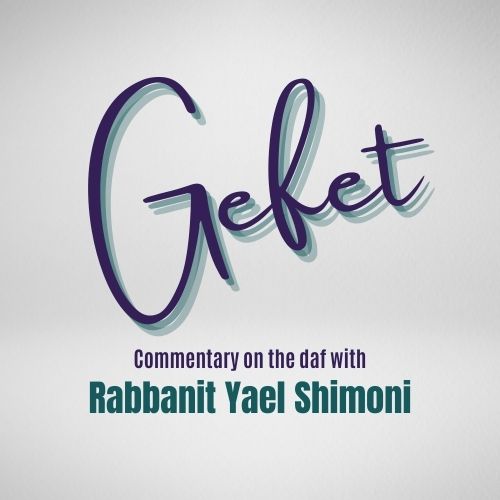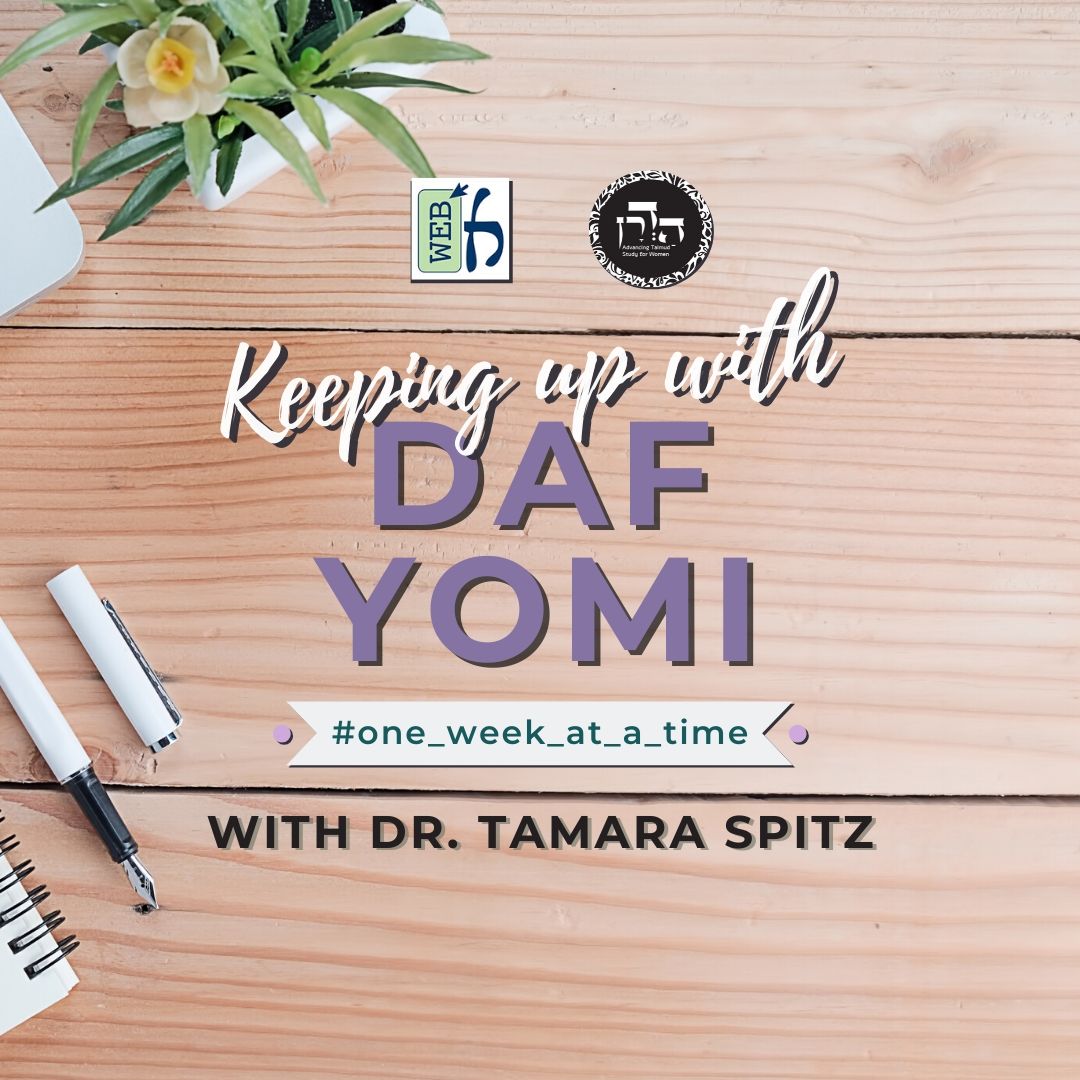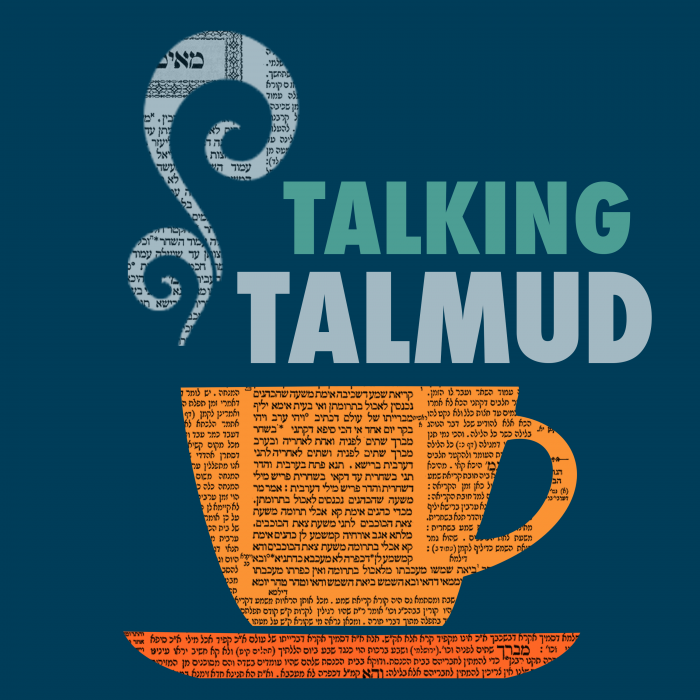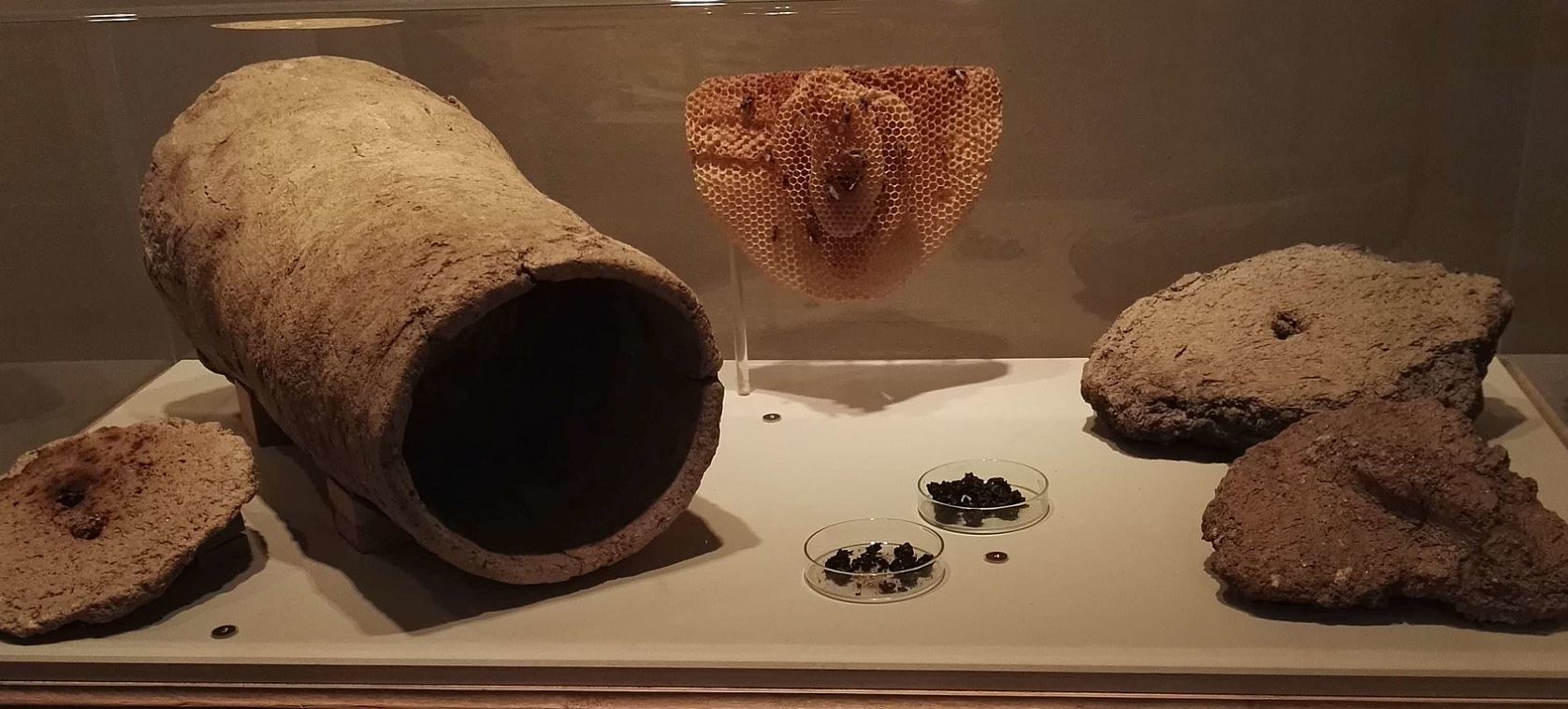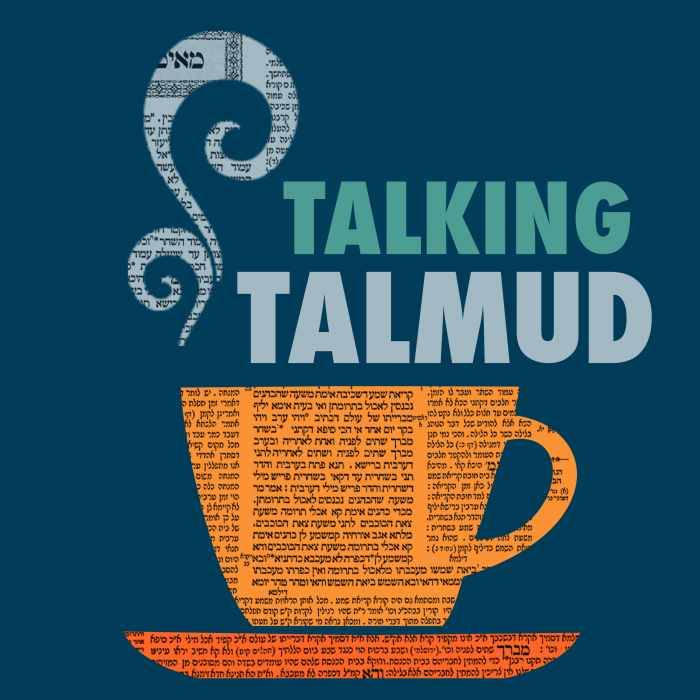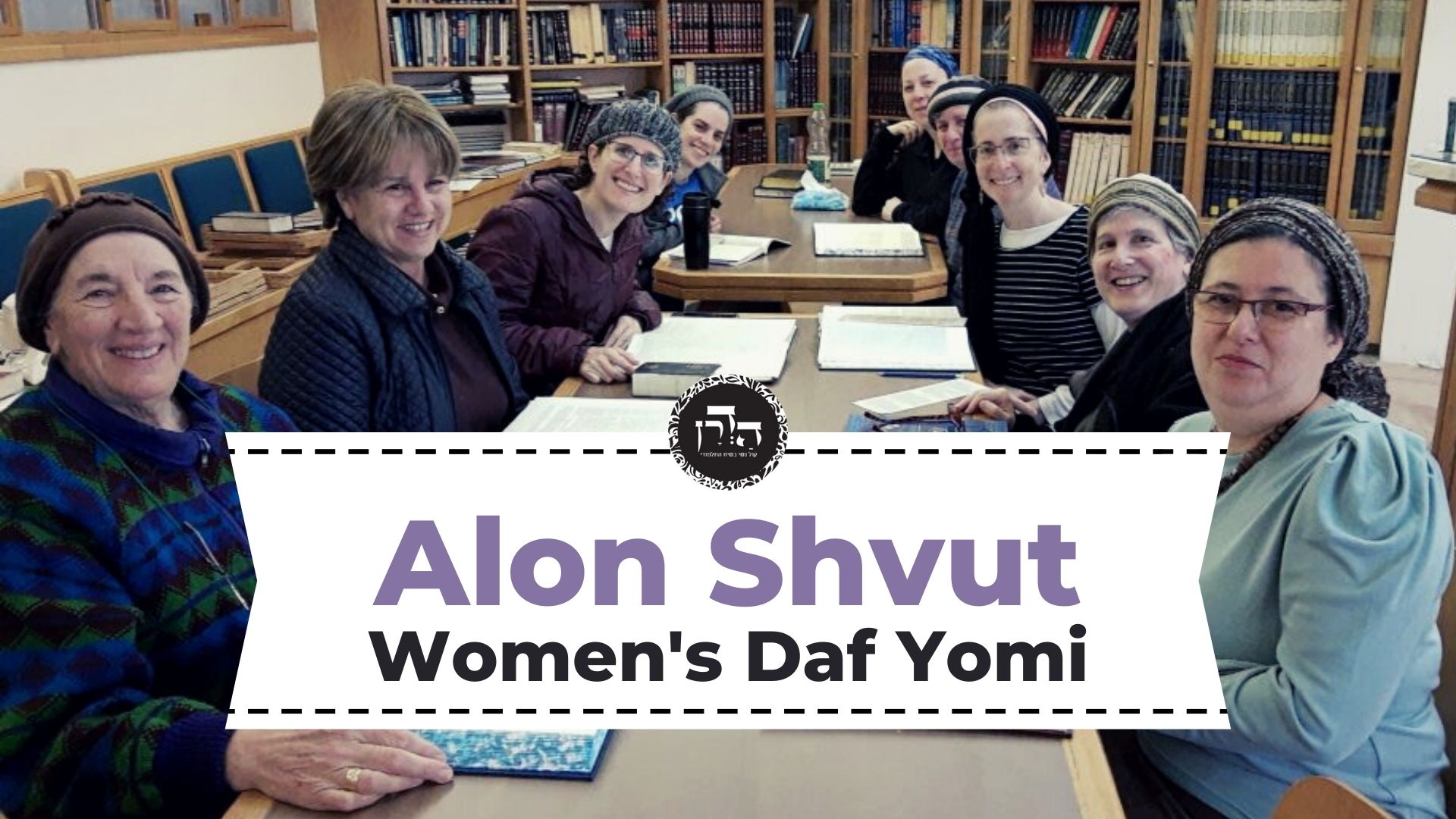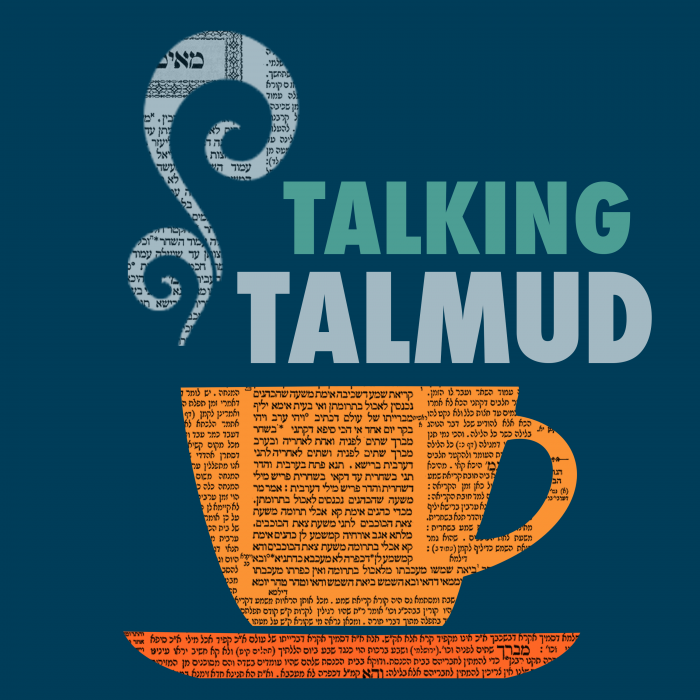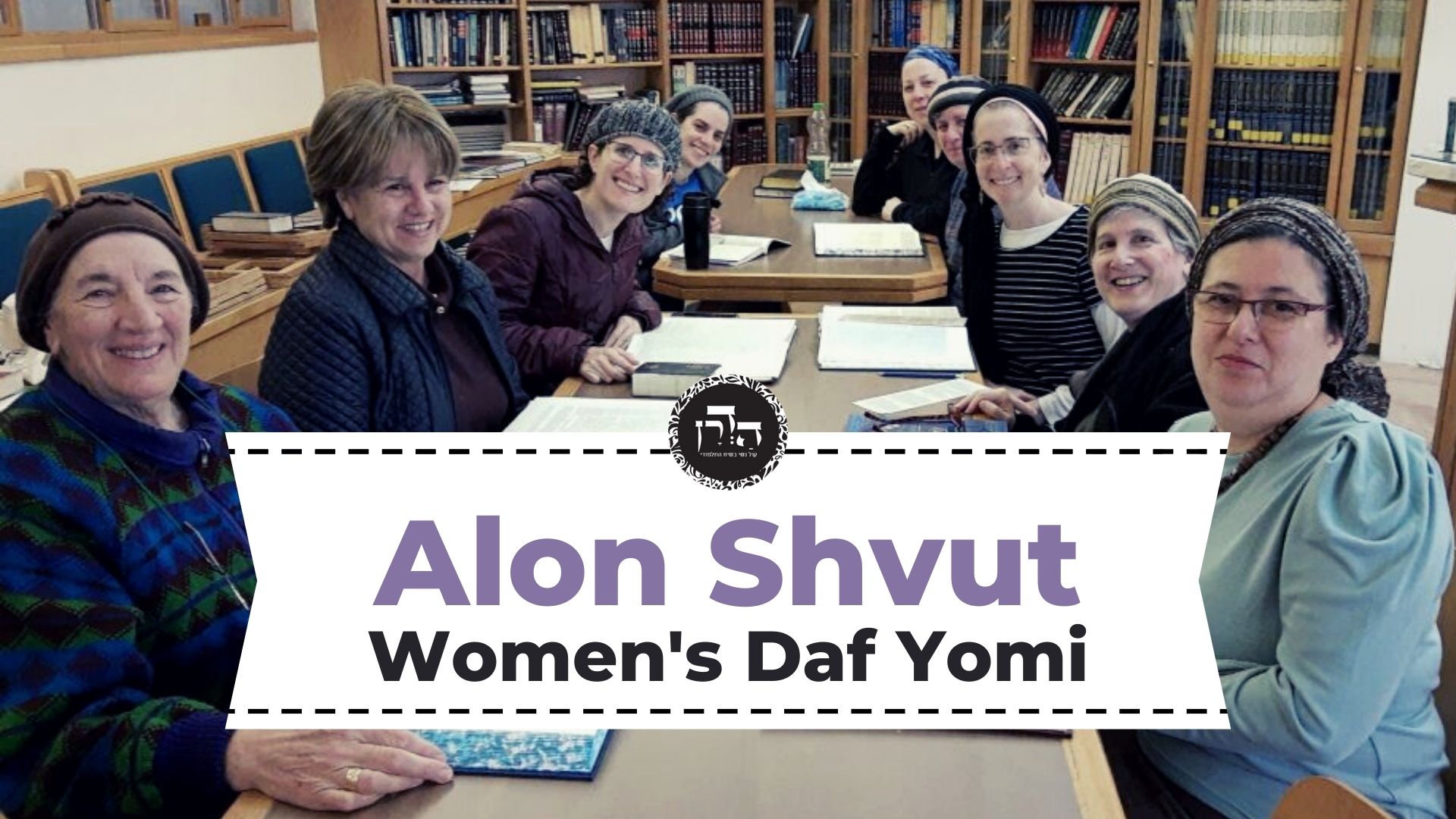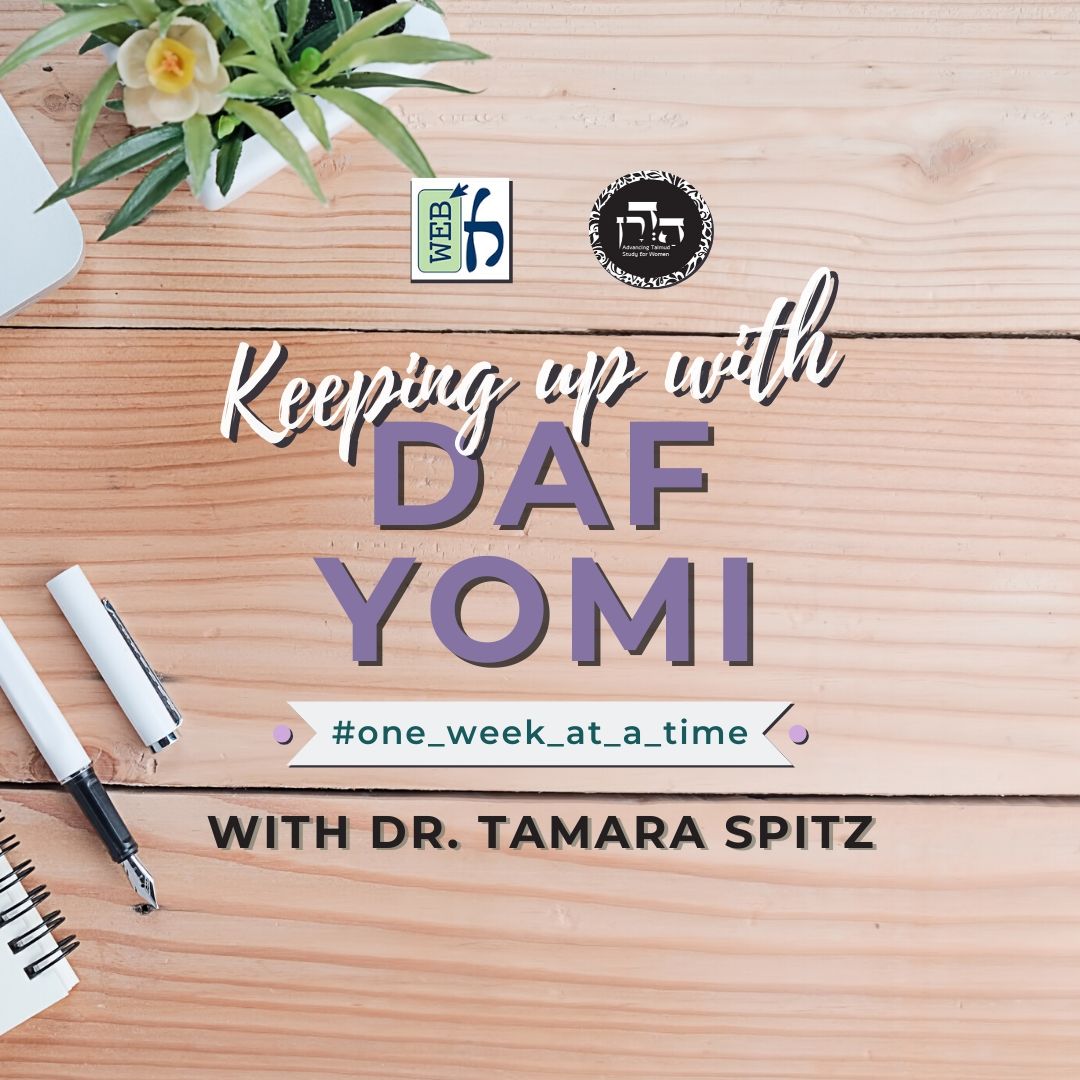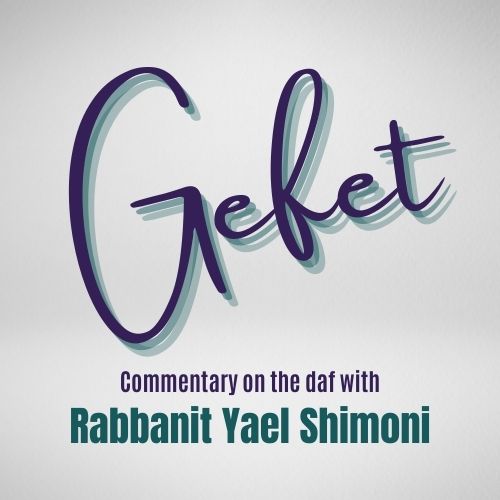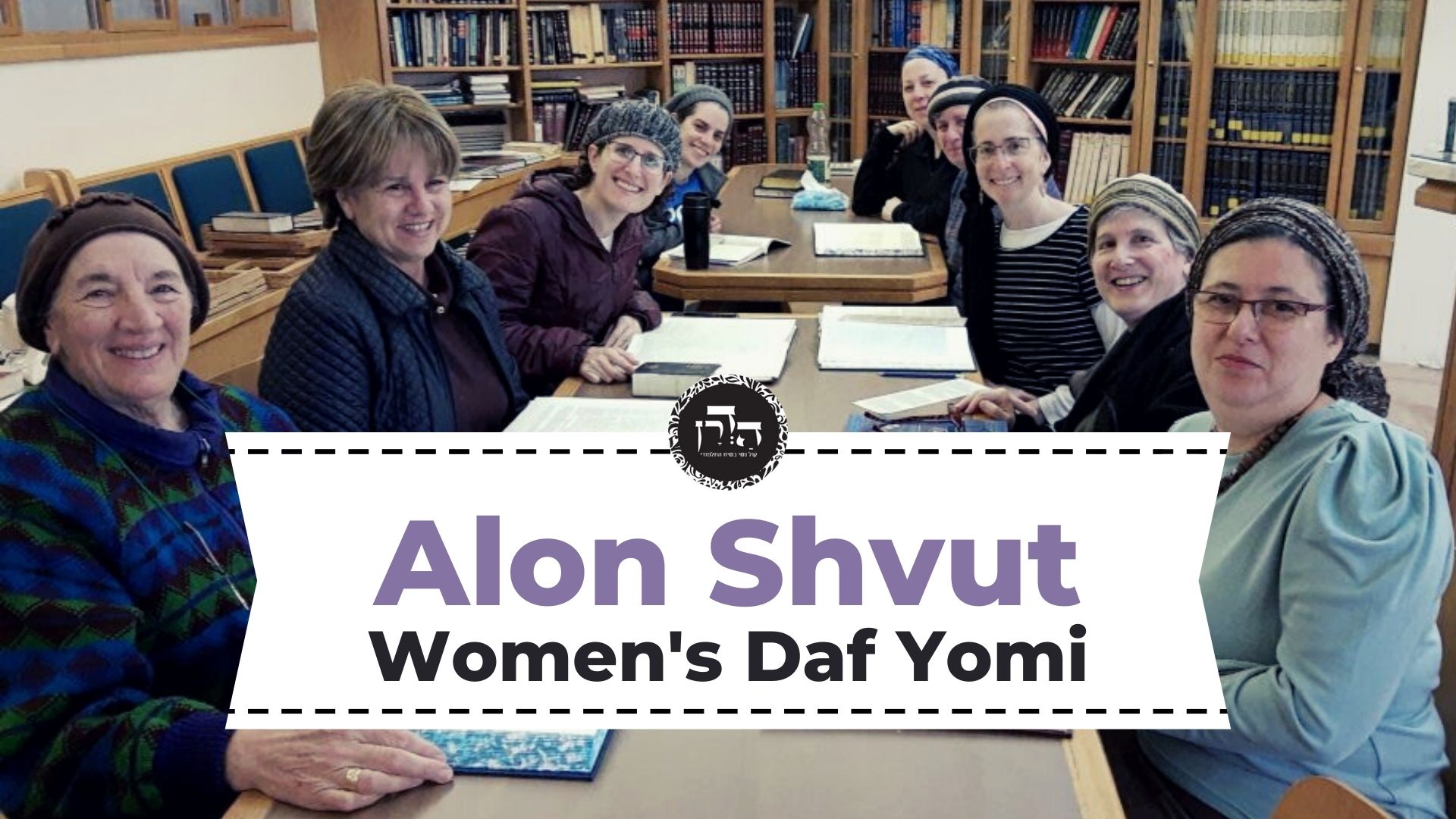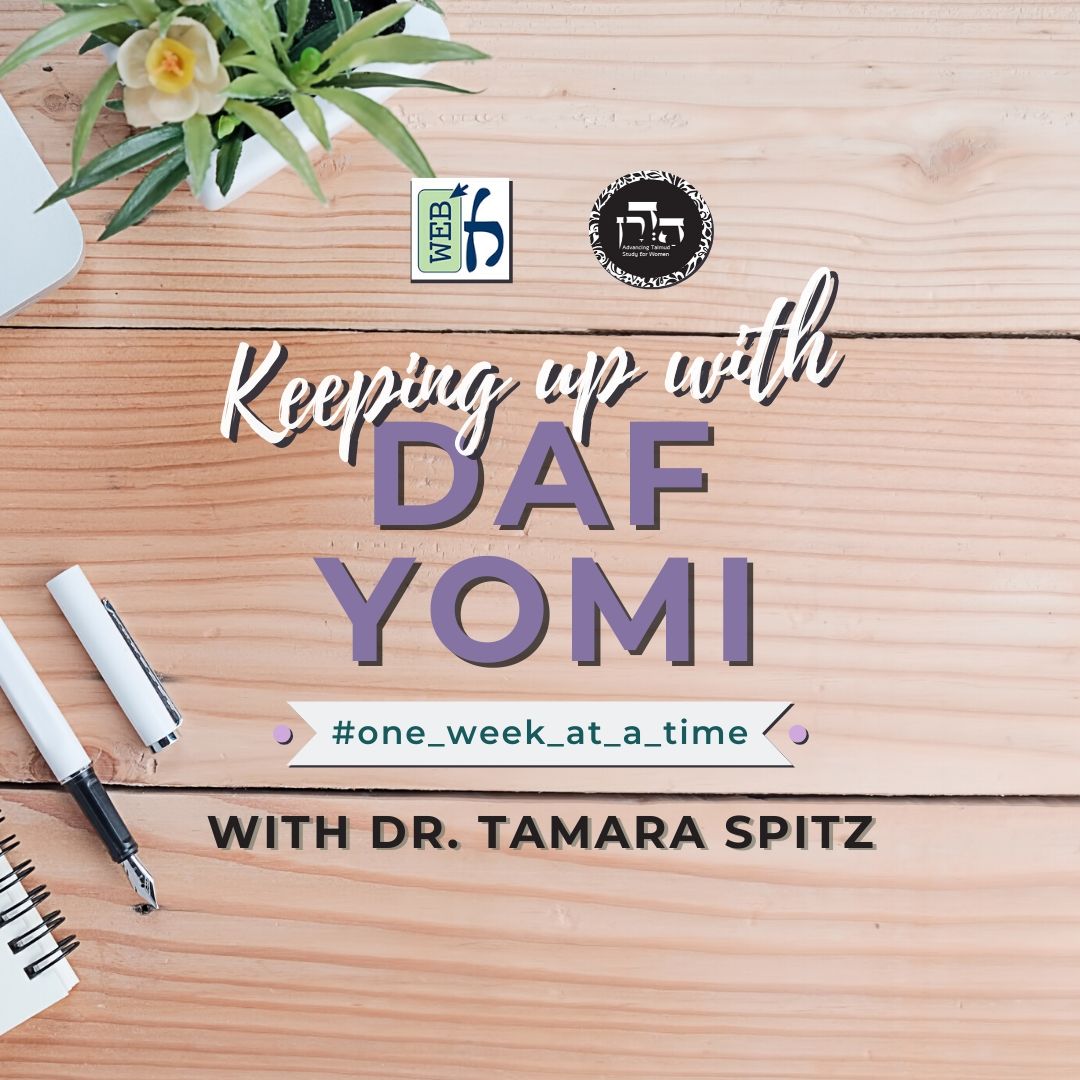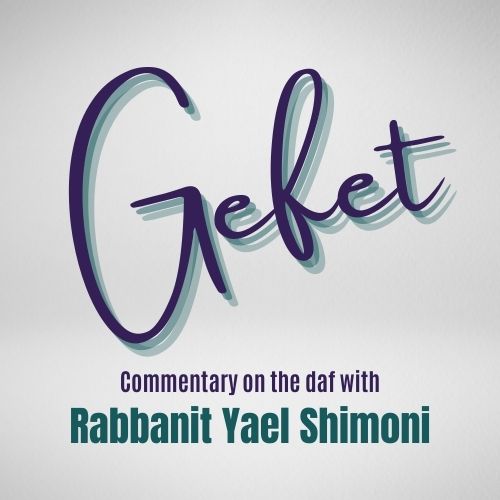Beitzah 3
גְּזֵרָה שֶׁמָּא יַעֲלֶה וְיִתְלוֹשׁ. הִיא גּוּפַהּ גְּזֵרָה, וַאֲנַן נֵיקוּם וְנִגְזוֹר גְּזֵרָה לִגְזֵרָה? כּוּלָּהּ חֲדָא גְּזֵרָה הִיא.
It is a decree lest one climb the tree and pick the fruit, as this would constitute the prohibited labor of harvesting. If so, the prohibition against eating fruit is itself due to a decree. And will we arise and issue a decree to prevent violation of another decree? Rav Yosef responded: That is not so; rather, when the Sages issued the initial decree, they enacted the prohibitions against both fruit that fall and a laid egg, as all the prohibitions are components of one decree. In other words, the similar cases of the fruit and the egg were both included in the original decree.
רַבִּי יִצְחָק אָמַר: גְּזֵרָה מִשּׁוּם מַשְׁקִין שֶׁזָּבוּ.
Rabbi Yitzḥak said a different reason: An egg that was laid on a Festival is prohibited as a decree due to liquids that seeped from the fruit (Eiruvin 39b), which is prohibited on that day. The legal status of an egg that was laid on a Festival is like that of liquids that seeped from a fruit on a Festival.
אֲמַר לֵיהּ אַבָּיֵי: מַשְׁקִין שֶׁזָּבוּ טַעְמָא מַאי — גְּזֵרָה שֶׁמָּא יִסְחוֹט, הִיא גּוּפַהּ גְּזֵרָה, וַאֲנַן נֵיקוּם וְנִגְזוֹר גְּזֵרָה לִגְזֵרָה? כּוּלַּהּ חֲדָא גְּזֵרָה הִיא.
Abaye said to him: With regard to liquid that seeped from fruit, what is the reason that the Sages prohibited it? It is a decree lest one purposely squeeze the fruit, and thereby perform the prohibited labor of threshing. However, the prohibition against consuming this juice is itself a rabbinic decree. And will we arise and issue a decree to prevent violation of another decree? Rabbi Yitzḥak replied: All the prohibitions are components of one decree. When the Sages prohibited this juice, they banned the eating of an egg laid on a Festival for the same reason, as the actions are similar.
כּוּלְּהוּ כְּרַב נַחְמָן לָא אָמְרִי — כִּי קוּשְׁיַין. כְּרַבָּה נָמֵי לָא אָמְרִי — הֲכָנָה לֵית לְהוּ.
As various explanations have been offered for this mishna, the Gemara seeks to clarify why each Sage was dissatisfied with the other explanations and suggested an alternative. The Gemara says: All of them, Rabba, Rav Yosef, and Rabbi Yitzḥak, did not state their explanations in accordance with the opinion of Rav Naḥman, as stated in our previously stated objection to Rav Naḥman’s explanation. The other Sages also did not state their explanations in accordance with the opinion of Rabba, as they do not accept that there is a Torah prohibition of using items whose preparation was from Shabbat to a Festival or from a Festival to Shabbat.
אֶלָּא רַב יוֹסֵף מַאי טַעְמָא לָא אָמַר כְּרַבִּי יִצְחָק? אָמַר לָךְ: בֵּיצָה אוּכְלָא, וּפֵירוֹת אוּכְלָא. לְאַפּוֹקֵי מַשְׁקִין — דְּלָאו אוּכְלָא.
However, the following question arises: Since Rav Yosef provides an explanation that is similar to that of Rabbi Yitzḥak, what is the reason that he did not state his explanation in accordance with the opinion of Rabbi Yitzḥak? The Gemara answers that Rav Yosef could have said to you: An egg is food, and fruit is food, i.e., an egg is comparable to fruits that fall. This observation would serve to exclude juice, which is not food but drink. Consequently, an egg is not comparable to juice and would not be included in the same decree.
וְרַבִּי יִצְחָק מַאי טַעְמָא לָא אָמַר כְּרַב יוֹסֵף? אָמַר לָךְ: בֵּיצָה בְּלוּעָה, וּמַשְׁקִין בְּלוּעִין. לְאַפּוֹקֵי פֵּירוֹת — דְּמִגַּלּוּ וְקָיְימוּ.
The Gemara asks the reverse question: And with regard to Rabbi Yitzḥak, what is the reason that he did not state his explanation in accordance with the opinion of Rav Yosef? The Gemara answers: He could have said to you that the case of an egg is more similar to juices that seep from fruit. How so? An egg is enclosed inside a chicken before it is laid, and likewise juice is enclosed inside the fruit. This observation serves to exclude fruits that fall from a tree, which are standing exposed on the tree. Therefore, the comparison between fruits that fall and an egg is weaker than the comparison between liquid that seeped from fruit and an egg.
וְאַף רַבִּי יוֹחָנָן סָבַר גְּזֵרָה מִשּׁוּם מַשְׁקִין שֶׁזָּבוּ. דְּרַבִּי יוֹחָנָן רָמֵי דְּרַבִּי יְהוּדָה אַדְּרַבִּי יְהוּדָה, וּמְשַׁנֵּי.
§ The Gemara notes: And Rabbi Yoḥanan also holds that the prohibition against eating an egg laid on a Festival is a decree due to liquid that seeped from fruit. What proof can be cited for this? It is proven as Rabbi Yoḥanan raised a contradiction between one statement of Rabbi Yehuda and a different statement of Rabbi Yehuda, and he resolved the apparent contradiction in a manner that indicates his own opinion.
תְּנַן: אֵין סוֹחֲטִין אֶת הַפֵּירוֹת לְהוֹצִיא מֵהֶן מַשְׁקִין, וְאִם יָצְאוּ מֵעַצְמָן — אֲסוּרִין. רַבִּי יְהוּדָה אוֹמֵר: אִם לָאוֹכָלִין — הַיּוֹצֵא מֵהֶן מוּתָּר, וְאִם לְמַשְׁקִין — הַיּוֹצֵא מֵהֶן אָסוּר.
The Gemara elaborates on the previous statement. We learned in a mishna (Shabbat 143b): One may not squeeze fruits to extract liquids from them on Shabbat, and if the liquids seeped out on their own, it is prohibited to use them on Shabbat, lest he come to squeeze fruits intentionally. Rabbi Yehuda says: If the fruit is designated for eating, e.g., apples, the liquid that seeps from them is permitted. Since there is no concern that one might squeeze the fruit, there is no reason to prohibit its liquid. And if the fruit was originally designated for liquids, such as grapes for wine, there are grounds for concern that one might squeeze them, and therefore the liquid that seeps from them is prohibited.
אַלְמָא כָּל אוֹכָלִין לְרַבִּי יְהוּדָה — אוּכְלָא דְאִפְּרַת הוּא.
From the fact that Rabbi Yehuda said that liquid from fruit intended for eating is permitted, one can infer that, apparently, all food that comes out of another food is classified as food that was separated, according to the opinion of Rabbi Yehuda. Food that was separated is not considered a new food, but part of the food that previously existed.
וּרְמִינְהוּ, וְעוֹד אָמַר רַבִּי יְהוּדָה: מַתְנֶה אָדָם עַל כַּלְכָּלָה שֶׁל פֵּירוֹת בְּיוֹם טוֹב רִאשׁוֹן,
And the Gemara raises a contradiction against this from a different source: And Rabbi Yehuda said further, concerning untithed fruit, which may not be rendered fit to be eaten on a Festival by separating teruma and tithes from it (Eiruvin 39a): A person may stipulate a condition with regard to a basket of untithed fruit on the first day of a Festival, and say: If today is the true Festival day, the second Festival day is actually a weekday. Therefore, this fruit is permitted, once I separate tithes from it, as on any other weekday. And vice versa: If today is, in fact, a weekday, and tomorrow is the Festival, I hereby separate its tithes today.
וְאוֹכְלָהּ בַּשֵּׁנִי. וְכֵן בֵּיצָה שֶׁנּוֹלְדָה בָּרִאשׁוֹן, תֵּאָכֵל בַּשֵּׁנִי.
Likewise, on the following day, he should again stipulate: If today is a weekday and yesterday was holy, I hereby separate tithes from the fruit now; if today is holy and yesterday was a weekday, separating the tithes yesterday was sufficient. And he may then eat the produce on the second Festival day, as in either case no prohibition is involved. And similarly, an egg laid on the first Festival day may be eaten on the second day, regardless of which day is the actual Festival.
בַּשֵּׁנִי אִין, בָּרִאשׁוֹן לָא! וּמְשַׁנֵּי רַבִּי יוֹחָנָן: מוּחְלֶפֶת הַשִּׁיטָה.
Rabbi Yehuda’s statement indicates that on the second day, yes, it is permitted to partake of the egg; but if the egg was laid on the first day, no, one may not eat it. If so, Rabbi Yehuda apparently contradicts himself, as he said previously that liquid from food prepared for eating has the same status as the food itself, and that its emergence is considered to be nothing more than the separation of two foods from each other. And Rabbi Yoḥanan resolves the difficulty: The attribution of the opinions with regard to the second day of the Festival is reversed (Berakhot 17b), so that Rabbi Yehuda’s opinion corresponds with his ruling above.
וּמִדְּקָא מַרְמֵי לְהוּ אַהֲדָדֵי, שְׁמַע מִינַּהּ חַד טַעְמָא הוּא.
The significance of Rabbi Yoḥanan’s statement for the issue at hand is as follows: Since Rabbi Yoḥanan raised a contradiction between the cases of an egg and liquid that oozed, one may conclude from this that it is the same reason in both cases, i.e., an egg is prohibited on a Festival due to the rabbinic decree against liquid that oozed from fruit.
רָבִינָא אָמַר: לְעוֹלָם לָא תֵּיפוֹךְ, וְרַבִּי יְהוּדָה לְדִבְרֵיהֶם דְּרַבָּנַן קָאָמַר לְהוּ:
With regard to the contradiction presented by Rabbi Yoḥanan, which led him to suggest that the opinions should be reversed, Ravina said that this is not the only possible resolution: Actually, do not reverse the opinions. Rather, in the case of the two Festival days, one could claim that Rabbi Yehuda spoke to them in accordance with the statement of the Rabbis, rather than presenting his own opinion.
לְדִידִי אֲפִילּוּ בָּרִאשׁוֹן נָמֵי שַׁרְיָא, דְּאוּכְלָא דְאִפְּרַת הוּא. אֶלָּא לְדִידְכוּ — אוֹדוֹ לִי מִיהַת דְּבַשֵּׁנִי שַׁרְיָא, דִּשְׁתֵּי קְדוּשּׁוֹת הֵן. וְאָמְרִי לֵיהּ רַבָּנַן: לָא, קְדוּשָּׁה אַחַת הִיא.
If so, Rabbi Yehuda’s statement should be understood as follows: In my opinion, even on the first Festival day, the egg is also permitted, as it is food that was separated. However, according to your opinion, which is that you prohibit liquid that comes from food, at least agree with me that it is permitted on the second day, as they are two sanctities. The first and second days of Rosh HaShana are not one unit, but two separate entities. Therefore, it is possible that the first day is sacred, while the second is a weekday. Consequently, an item prohibited on the first day might be permitted on the second. And the Rabbis said to him: No, the two days are one sanctity, i.e., they are viewed as a single continuous unit. The uncertainty applies equally to both of them.
רָבִינָא בְּרֵיהּ דְּרַב עוּלָּא אָמַר: הָכָא בְּתַרְנְגוֹלֶת הָעוֹמֶדֶת לְגַדֵּל בֵּיצִים, וְרַבִּי יְהוּדָה לְטַעְמֵיהּ, דְּאִית לֵיהּ מוּקְצֶה.
Ravina, son of Rav Ulla, said: There is an alternative resolution to the contradiction raised by Rabbi Yoḥanan. Here, in the case of the egg laid on a Festival, Rabbi Yehuda prohibited eating the egg since it is not from a chicken designated for food, whose legal status is that of food. Rather, the case refers to a chicken designated for laying eggs, and Rabbi Yehuda conforms to his standard line of reasoning, as he holds that there is a prohibition of muktze. Since the egg is produced by something muktze, it is certainly muktze itself, which means that the halakha of food that was separated is inapplicable to this case.
מֵיתִיבִי: אֶחָד בֵּיצָה שֶׁנּוֹלְדָה בְּשַׁבָּת וְאֶחָד בֵּיצָה שֶׁנּוֹלְדָה בְּיוֹם טוֹב — אֵין מְטַלְטְלִין אוֹתָהּ, לֹא לְכַסּוֹת בָּהּ אֶת הַכְּלִי, וְלֹא לִסְמוֹךְ בָּהּ כַּרְעֵי הַמִּטָּה.
§ The Gemara raises an objection from a baraita, which clarifies the issue differently: Both an egg that was laid on Shabbat and an egg that was laid on a Festival are considered to be muktze, and therefore in both cases, one may not move the egg, neither for the sake of food nor for any other purpose: Not to cover a vessel with it, nor to support the legs of a bed with it.
אֲבָל כּוֹפֶה עָלֶיהָ אֶת הַכְּלִי בִּשְׁבִיל שֶׁלֹּא תִּשָּׁבֵר. וּסְפֵיקָא אֲסוּרָה, וְאִם נִתְעָרְבָה בְּאֶלֶף — כּוּלָּן אֲסוּרוֹת.
However, if one wishes, he may cover the egg with a vessel, without handling the egg itself, so that it does not break from being accidentally trodden upon. Although it is prohibited to move the egg itself, it is nevertheless permitted to move a vessel for its sake. And even if there is uncertainty with regard to whether this egg was laid on a Festival, it is prohibited to move it. And, furthermore, if it became intermingled with a thousand permitted eggs, they are all prohibited.
בִּשְׁלָמָא לְרַבָּה, דְּאָמַר מִשּׁוּם הֲכָנָה, הָוֵי סְפֵיקָא דְאוֹרָיְיתָא — וְכׇל סְפֵיקָא דְאוֹרָיְיתָא לְחוּמְרָא.
The Gemara notes: Granted, according to the opinion of Rabba, who said that an egg is prohibited due to the lack of preparation, this case involves an uncertainty with regard to the legal status of an item prohibited by Torah law; and in any case of an uncertainty with regard to the legal status of an item prohibited by Torah law, the ruling is stringent. Therefore, the egg is prohibited even if there is uncertainty whether it was laid on a Festival.
אֶלָּא לְרַב יוֹסֵף וּלְרַבִּי יִצְחָק, דְּאָמְרִי מִשּׁוּם גְּזֵרָה, סְפֵיקָא דְרַבָּנַן הִיא — וְכׇל סְפֵיקָא דְרַבָּנַן לְקוּלָּא!
However, according to the opinions of Rav Yosef and Rabbi Yitzḥak, who say that an egg is prohibited due to a decree, this case involves an uncertainty with regard to the legal status of an item prohibited by rabbinic law, and in any case of an uncertainty with regard to the legal status of an item prohibited by rabbinic law, the ruling is lenient.
(אֲמַר לֵיהּ:) סֵיפָא אֲתָאן לִסְפֵק טְרֵפָה.
The Gemara answers: In the latter clause of the baraita, we have arrived at a different case. The case does not involve the prohibition of an egg laid on a Festival; the case involves an egg laid by a chicken with regard to which there is uncertainty whether it is an animal with a condition that will cause it to die within twelve months [tereifa], which is prohibited by Torah law. The uncertainty with regard to the legal status of the chicken is relevant to the egg.
אִי הָכִי, אֵימָא סֵיפָא: נִתְעָרְבָה בְּאֶלֶף — כּוּלָּן אֲסוּרוֹת. אִי אָמְרַתְּ בִּשְׁלָמָא סָפֵק יוֹם טוֹב סָפֵק חוֹל, הָוֵי דָּבָר שֶׁיֵּשׁ לוֹ מַתִּירִין, וְכׇל דָּבָר שֶׁיֵּשׁ לוֹ מַתִּירִין — אֲפִילּוּ בְּאֶלֶף לֹא בָּטֵיל.
The Gemara raises a difficulty with this response: If so, say the latter clause of that same baraita: If it became intermingled with a thousand other eggs, they are all prohibited. Granted, if you say that there is uncertainty whether the egg was laid on a Festival and uncertainty whether it was laid on a weekday, then it is an object whose prohibition is temporary, as the egg will be permitted on the following day, and the principle is: Any object whose prohibition is temporary is not nullified, even by a thousand permitted items. Since its prohibition will lapse on its own, there is no need to make use of the option of nullification.
אֶלָּא אִי אָמְרַתְּ סְפֵק טְרֵפָה, דָּבָר שֶׁאֵין לוֹ מַתִּירִין הִיא, וְתִבְטַל בְּרוּבָּא!
However, if you say that the egg referred to in the baraita is an uncertain tereifa, it is an object whose prohibition is not temporary, as there is no way to permit the prohibition of tereifa, and it should therefore be nullified by a simple majority.
וְכִי תֵּימָא בֵּיצָה חֲשׁוּבָה וְלֹא בָּטְלָה, הָנִיחָא לְמַאן דְּאָמַר: כׇּל שֶׁדַּרְכּוֹ לִימָּנוֹת שָׁנִינוּ.
The Gemara adds: And if you say that an egg is significant and is not nullified, as nullification applies only to items that have no intrinsic significance, while a significant object cannot be nullified, that works out well according to the one who said that we learned: Any item whose manner is also to be counted, i.e., that is sometimes sold by unit, rather than by weight or volume, is considered significant. An egg falls into that category, as it is sometimes sold by unit.
אֶלָּא לְמַאן דְּאָמַר: אֶת שֶׁדַּרְכּוֹ לִימָּנוֹת שָׁנִינוּ, מַאי אִיכָּא לְמֵימַר!
However, according to the one who said that we learned: That item whose manner is exclusively to be counted, i.e., that is always sold by unit, is considered significant, what can be said? Although eggs are often sold by unit, they are also often sold by weight or volume.
דִּתְנַן: מִי שֶׁהָיוּ לוֹ חֲבִילֵי תִּלְתָּן שֶׁל כִּלְאֵי הַכֶּרֶם — יִדְלְקוּ. נִתְעָרְבוּ בַּאֲחֵרוֹת, וַאֲחֵרוֹת בַּאֲחֵרוֹת — כּוּלָּן יִדָּלְקוּ, דִּבְרֵי רַבִּי מֵאִיר. וַחֲכָמִים אוֹמְרִים: יַעֲלוּ בְּאַחַת וּמָאתַיִם.
The Gemara cites the mishna where the dispute cited above appears. As we learned (Orla 3:6–7): With regard to one who had bundles of clover, a type of legume, that were diverse kinds of food crops that grew in a vineyard, from which it is prohibited to derive benefit, those bundles must be burned. If the bundles were intermingled with others, and those others were intermingled with others, they must all be burned. This is the statement of Rabbi Meir. And the Rabbis say: They may be nullified by one part in two hundred similar parts. When the prohibited portion is less than one-half of one percent of the permitted portion, the prohibition is nullified.
שֶׁהָיָה רַבִּי מֵאִיר אוֹמֵר: אֶת שֶׁדַּרְכּוֹ לִמָּנוֹת — מְקַדֵּשׁ; וַחֲכָמִים אוֹמְרִים: אֵינוֹ מְקַדֵּשׁ אֶלָּא שִׁשָּׁה דְּבָרִים בִּלְבַד; רַבִּי עֲקִיבָא אוֹמֵר: שִׁבְעָה. וְאֵלּוּ הֵן: אֱגוֹזֵי פֶּרֶךְ, וְרִמּוֹנֵי בָּאדָן, וְחָבִיּוֹת סְתוּמוֹת, וְחִלְפֵי תְרָדִין, וְקִלְחֵי כְרוּב, וְדַלַּעַת יְוָנִית. רַבִּי עֲקִיבָא מוֹסִיף אַף כִּכָּרוֹת שֶׁל בַּעַל הַבַּיִת.
The mishna continues: Rabbi Meir says that they must all be burned, as Rabbi Meir would say: That whose manner is exclusively to be counted, is considered significant and cannot be nullified. Therefore, it renders the entire mixture forbidden, and it must be burned. And the Rabbis say: Only six items are sufficiently significant to render the entire mixture forbidden. Rabbi Akiva says: There are seven. And they are: High-quality nuts from Perekh, and pomegranates from Badan, and sealed barrels of wine, and branches of spinach, and cabbage stalks, and Greek pumpkin. Rabbi Akiva adds: Even loaves of a homeowner.
הָרָאוּי לְעׇרְלָה — עׇרְלָה. הָרָאוּי לְכִלְאֵי הַכֶּרֶם — כִּלְאֵי הַכֶּרֶם. וְאִתְּמַר עֲלַהּ, רַבִּי יוֹחָנָן אָמַר: אֶת שֶׁדַּרְכּוֹ לִמָּנוֹת שָׁנִינוּ. וְרַבִּי שִׁמְעוֹן בֶּן לָקִישׁ אָמַר: כׇּל שֶׁדַּרְכּוֹ לִמָּנוֹת שָׁנִינוּ.
Different prohibitions apply to these seven items. That which is fit to be forbidden due to orla, fruit that grows during the first three years after a tree is planted, is forbidden due to orla. That which is fit to be forbidden due to diverse kinds of food crops that grew in a vineyard is forbidden due to diverse kinds in a vineyard (Avoda Zara 74a). And it was stated about the wording of this mishna that there is an amoraic dispute. Rabbi Yoḥanan said that we learned: Only that whose manner is exclusively to be counted is significant and cannot be nullified, and it is therefore prohibited by Rabbi Meir. And Rabbi Shimon ben Lakish said that we learned: Any item whose manner is also to be counted, is significant and cannot be nullified.
הָנִיחָא לְרַבִּי שִׁמְעוֹן בֶּן לָקִישׁ, אֶלָּא לְרַבִּי יוֹחָנָן — מַאי אִיכָּא לְמֵימַר?
Returning to the matter of the egg, the Gemara reprises its question: This works out well according to the opinion of Rabbi Shimon ben Lakish, but according to Rabbi Yoḥanan, what can be said? Since an egg is not sold exclusively by unit, it is not significant. Therefore, the egg of a tereifa should be nullified by a simple majority.
אָמַר רַב פָּפָּא: הַאי תַּנָּא — תַּנָּא דְּלִיטְרָא קְצִיעוֹת הוּא, דְּאָמַר: כׇּל דָּבָר שֶׁבְּמִנְיָן, אֲפִילּוּ בִּדְרַבָּנַן לֹא בָּטֵיל, וְכׇל שֶׁכֵּן בִּדְאוֹרָיְיתָא.
Rav Pappa said: According to Rabbi Yoḥanan, this tanna, who said that an egg cannot be nullified, is the tanna of the halakha concerning a litra of dried figs, who, based on his statement, said: Any item that is counted, even if it is prohibited by rabbinic law, cannot be nullified, and all the more so items prohibited by Torah law, e.g., the egg of a tereifa.
דִּתְנַן: לִיטְרָא קְצִיעוֹת שֶׁדְּרָסָהּ עַל פִּי עִגּוּל, וְאֵינוֹ יוֹדֵעַ בְּאֵיזֶה עִגּוּל דְּרָסָהּ, עַל פִּי חָבִית, וְאֵינוֹ יוֹדֵעַ בְּאֵיזוֹ חָבִית דְּרָסָהּ, עַל פִּי כַּוֶּרֶת, וְאֵינוֹ יוֹדֵעַ בְּאֵיזוֹ כַּוֶּרֶת דְּרָסָהּ. רַבִּי מֵאִיר אוֹמֵר, רַבִּי אֱלִיעֶזֶר
As we learned in a mishna: With regard to a litra of dried figs, whose stems were removed, and were dried and pressed in different vessels and shaped into circles, the obligation to tithe fruits is by rabbinic law. If one forgot to tithe the figs, and later remembered that he placed the figs into a barrel, and during the process of producing a circle he pressed the figs onto the mouth of one of the circular vessels in which the circles are formed, and does not know into which circular vessel he pressed it; or, if he recalls that he pressed it on the mouth of a barrel, but does not know in which barrel he pressed it, or if he recalls that he pressed it on the mouth of a straw receptacle, but does not know in which receptacle he pressed it, Rabbi Meir says that in all these cases there is a dispute between the tanna’im of the previous generation: Rabbi Eliezer



